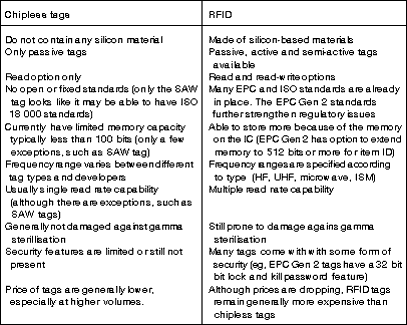
With the growing demand for lower cost RFID tags, innovations in chip design and other elements of the technology have reduced the price.
However, the price of these tags still remains high and restricts their wide-scale implementation in various applications. As further efforts are being undertaken by various RFID tag makers to reduce costs, chipless tag technology is emerging as having the potential to provide similar functionalities to RFID, at potentially a fraction of the price.
The terms 'chipless ID' or 'polymer RFID' both refer to the technology commonly known as 'chipless tags'. Chipless tags do not contain the complex silicon integrated circuit that RFID tags do, and this reduces their price. Their working principles are however similar to RFID tags, in that they communicate and are read through radio frequencies.
Chipless tag technology is relatively new, but it is slowly gaining importance due to its ability to provide track and trace on a wide host of applications at a fraction of the cost of RFID technology. However, there are still a range of limitations that need to be resolved in order to ensure its proper incorporation. For instance, the technology still lacks the standards already present in RFID, and has limited functionality.
It is also important to note that chipless tags are not one single standalone technology. There are anywhere between two and three dozen different types of technologies that in essence do not contain any silicon-based materials and are therefore considered chipless. The chipless tag technologies that show the most potential are swept-RF-LC array tags, printed conductive ink, and surface acoustic wave (SAW) tags.
Although chipless tags have some distinct similarities to RFID, they also possess a few stark differences which will guide businesses in choosing the more suitable solution for their requirements. Furthermore, chipless tags may not replace RFID entirely but rather work alongside RFID to provide the best solution for end-users.
For both technologies, there is no line of sight required for their use. They both use radio frequency signals and are therefore able to be used in similar applications. Chipless tags are likely to find uses especially in applications for tracking and tracing items and supply chain management. They are also expected to be useful for electronic article surveillance and in security applications such as access tags and protecting documents.
The table below outlines the differences between chipless tags and RFID:

Conclusion
The future for chipless tag technology looks promising. Compared to RFID, chipless tag technology is still in its nascent stage and is expected to grow further in terms of functionality and applications. However, if this technology is to continue its positive growth, end-users need to understand their needs and requirements before deciding to adopt this technology. Potential end-users of chipless tags can learn from the past mistakes of early RFID adopters.
Chipless tags are not expected to completely replace RFID in the near future. Although their cost is significantly lower, they have limitations. Chipless tags are likely to work together with RFID in the same manner as UPC bar codes coexist with RFID. However, chipless tags may well be used more extensively for lower value items while RFID will be used primarily for items of higher value. Chipless tags also have the potential to dominate niche markets, for instance in the pharmaceutical industry, due to their ability to withstand gamma sterilisation.
An appropriate set of standards would eventually be one of the key drivers of this technology. With standards and guidelines set in place, interoperability issues are less likely to arise between vendors and the infrastructure as a whole. This is likely to reduce the amount of time, resources, and money that end-users spend on fixing unnecessary technical and product related issues.
For more information contact Patrick Cairns, Frost & Sullivan, +27 (0)21 680 3274.

© Technews Publishing (Pty) Ltd | All Rights Reserved